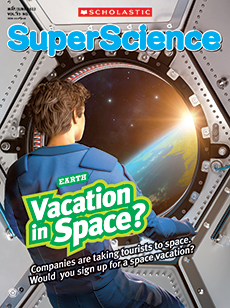NASA
Amy Ross
Three, two, one . . . blastoff! Humans have been traveling into space for almost 60 years. The trips often lead to exciting discoveries. But working in space is dangerous.
There’s no breathable air in space. And the temperatures can be extreme. The moon can be as hot as 123°C (253°F) and as cold as -233°C (-387°F). Astronauts are also exposed to high levels of radiation. This invisible energy from the sun and outer space can harm people’s health or even kill them. To stay safe in this harsh environment, astronauts have to wear spacesuits.
Who creates these spacesuits? Engineers like Amy Ross do. She works at NASA, the U.S. space agency. Ross helped design two new suits for NASA’s future missions to the moon. One suit is made for the launch and the return trip to Earth. The other will be worn on the moon’s surface.
The new spacesuits have many improvements over the ones worn during NASA’s moon missions from 1969 to 1972. Ross recently spoke with SuperScience about her work.
Three, two, one . . . blastoff! People have been traveling into space for almost 60 years. The trips often lead to exciting discoveries. But working in space is dangerous.
There’s no air to breathe in space. And the temperatures can be extreme. The moon can be as hot as 123°C (253°F). It can be as cold as -233°C (-387°F). Astronauts also face high levels of radiation. That is invisible energy from the sun and outer space. Radiation can harm people’s health or even kill them. That’s why astronauts have to wear spacesuits. The outfits keep them safe in the harsh environment of space.
Who creates these spacesuits? Engineers like Amy Ross do. She works at NASA. It’s the U.S. space agency. Ross helped design two new suits for NASA. They’ll be worn on future missions to the moon. One suit is made for the launch and return trip to Earth. The other will be worn on the moon’s surface.
NASA’s first spacesuits helped get astronauts to the moon. These missions took place from 1969 to 1972. But the new spacesuits are much more advanced. Ross recently spoke with SuperScience about her work.
